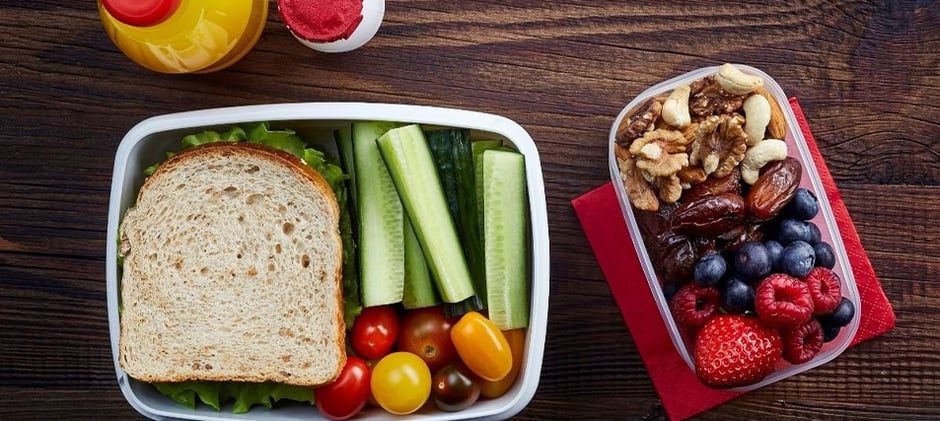9 Tips for Eating Healthy in College

Adapted from 1st Financial Bank USA's Blog
Going off to college brings with it major lifestyle changes. There’s a new environment, new people, and of course — new food. Like many college students, you may be intimidated by the idea of trying to eat healthy on your student schedule and budget, but that doesn’t mean it’s impossible.
You may be wondering, "What are some tips for eating healthy as a college student?" Most colleges provide healthy, accessible options for students, and there are plenty of inexpensive, healthy food options for college students that you can pick up from the store as well. Read on for tips and tricks on how to eat healthy in college (and avoid the freshman 15).
1. Eat Breakfast
Regardless of when you wake up, always eat a breakfast rich in fiber and protein. Breakfast is the most important meal of the day, and you should be feeding your brain as soon as you wake up to get ready for the day. If you’re rushing late to a class, grab a quick granola bar or a piece of fruit and peanut butter, or a protein smoothie. If you’re looking for breakfast options, try breakfast bars, overnight oats, oatmeal, yogurts/parfaits, and loaded toast. Don’t skip meals, especially the first meal of the day.
2. Be Wary of the Dining Hall
The college dining hall is a blessing to all students living on campus, but it’s also home to a lot of unhealthy options. Navigate with caution and self-control through all the unhealthy temptations to find healthy options. Head to the salad bar for fruits and vegetables, and choose a healthy salad dressing, like oil and vinegar. Pay attention to how any food you’re selecting is cooked; opt for grilled instead of fried. Finally, go for power foods. Skip the sugary processed options and head for protein and whole-grain to build a healthy meal.
3. Always Have a Water Bottle
Invest in a quality reusable water bottle. You might not realize it, but you could be spending parts of your days dehydrated. You should aim to drink at least 2 to 3 liters a day. Staying hydrated all day every day benefits cardiovascular health, helps muscles, joints, and skin. It also keeps your body cool and prevents dry mouth. Having water with you all the time will help keep you away from sugary drinks as well.

4. Always Have To-Go Snacks
It’s okay to keep that bag of chips in your dorm room, but when it comes to on-the-go last-minute snacks/meals, make sure you’re buying and making only healthy options. Keeping a healthy snack on you at all times keeps you from spending the extra money and feeding your unhealthy cravings – two things you’re trying to avoid in college. Dried fruit, nuts, or rice cakes make for an easy and healthy option for college students and provide quick ways to eat healthy in college.
5. Watch Your Caffeine
While one to two cups of caffeine a day is acceptable, an excessive amount of caffeine every day is unhealthy. Try to limit your number of caffeinated drinks each day, whether it’s soda, coffee, or tea. You’ll be surprised at how much better you feel. Instead of reaching for a caffeinated drink, reach for your water bottle.
6. Plan Your Grocery Shopping Trips
Before you head out to the market, make sure you have a grocery list. Try your best to refrain from buying too many unhealthy, processed snacks. Be sure you’re buying the right food to give your body all the protein and nutrients it needs for the week. Utilize coupons, student discounts, and sale items to save money on groceries. Aim for generic brands over name brands. Buy frozen veggies rather than fresh. Lastly, never go to the grocery store hungry.
7. Meal Prep
Meal planning and prepping can be a great way to help maintain a healthy diet. You don’t have to prepare breakfast, lunch, and dinner if you don’t want to, but try to prepare at least one meal per day. If you’re usually at class during breakfast and lunch, it might be a better idea to prep dinners for your week. Having easy access to pre-made meals will keep you away from unhealthy fast food and other temptations. Remember to keep in mind your meal prep recipes and ideas when you’re writing up your grocery list.
8. No Late Snacks or Meals
The treats commonly found in dorm room mini fridges may be tempting before bed, but teach yourself to stay away from late-night snacks, like ice cream. Even if the portion is small, it’s still a bad habit. The urge for late-night snacks is often a result of not eating enough during the day. If you are giving your body enough food throughout the day, you shouldn’t want or need to snack before bed. If you do get the urge to snack some before bed, instead of indulging use it as a reminder to eat better during the day. Create a better habit for yourself now, and you’ll be thankful in the future.
9. Indulge on Occasion
Following a strict healthy diet can be challenging, so don’t feel defeated if you have a cheat day every so often. You can eat that cupcake or have that extra scoop of ice cream, just do so sparingly.
Eating healthy on a college schedule and budget can be difficult, but it’s not impossible. Just like keeping up your grades, you need to work on keeping a healthy diet. It may be hard work, but we hope with these tips you can start to create healthy eating habits that’ll stick with you. Good luck!



